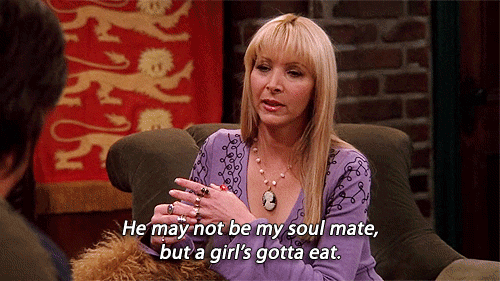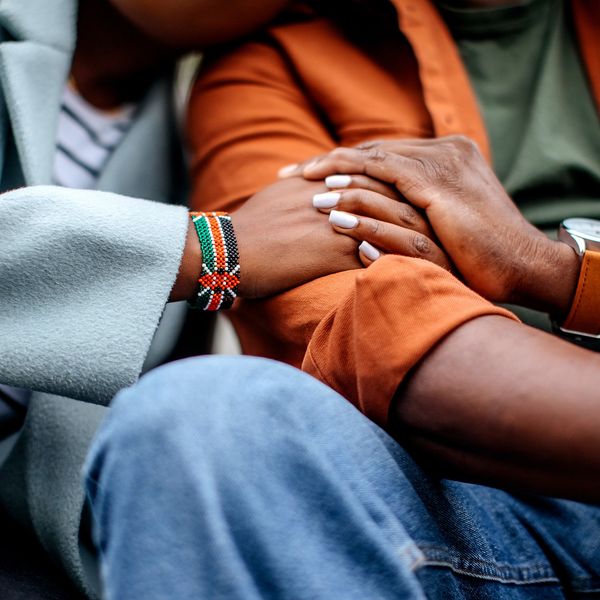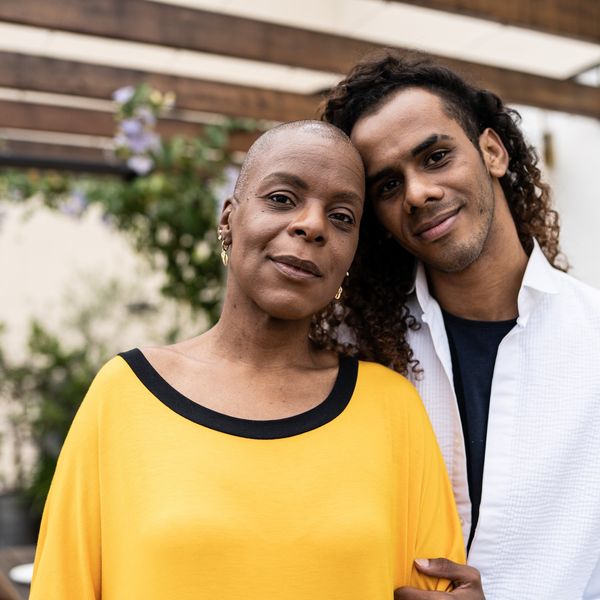Not too long ago, I was having a conversation with a newlywed wife who I could totally tell is still in the honeymoon stage of her relationship. Her eyes were beaming, her man's name came up every third sentence and, when she grabbed my hand to say grace with her, she made a point to rub my ring finger. Then, with a completely-non-patronizing-but-still-kind-of-awkward way, she looked at me and said, "Shellie, we've got to find you someone."
I'm not sure if by "we", she meant her and her man or her and the Lord but either way, I'm good. Not that defensive kind of good that I've seen single women throw out into the atmosphere that almost comes off as resentful or bitter rather than believable. What I mean is, what I say all of the time—"Until a man can love me the way that I know I can love a man, I need to remain single." It would belittle the institution of marriage and myself (not necessarily in that order) to do otherwise.
Besides, it's not like living the single life is some sort of consolation prize or something. One of the perks of being a marriage life coach is you're able to see the good that comes with being married. At the same time, you also get to see all of the sacrifices that come with it too. And ladies, there are more than just a few of 'em. There are almost so many that I should've rubbed on my sista-friend's ring finger and "aww-ed" her right on back.
It was that meal that inspired this piece. So, if you're a single woman—especially if you're a single woman who really wants to be married—please take a moment to at least skim through all of the reasons why you should not only tolerate your relational status but do a little dance right where you're standing.
Marriage is a beautiful thing. But girrrrrl, so is being single. Why do I say that? Read on.
1. Your Bed Is All Yours

One of my girlfriends is hilarious. Although she has a heart of gold, she isn't big on physical affection. Meanwhile, she married the kind of guy who can't even sit on the couch without making sure that one of his limbs is draped all over her. When I was talking to her about penning this, one of the things she said was, "I love my husband. But I'd kill for us to spend at least three nights a week in separate beds. We can't agree on the temperature, plus he sweats a lot and then has hurt feelings if I don't want to cuddle all throughout the night."
If you're someone who hates going to bed alone, I could see how you might be tempted to roll your eyes about her gripe. But as someone who likes to sleep right in the middle of my bed with my thermostat set to around 68 degrees and some rain ASMR playing, and as someone who wants to wake up when I feel like it and not because my hubby always wants to eat with me at the crack of dawn (which is something else my friend's husband does), I totally feel her "pain". When you're single, you can pick and choose if/when you want to share your bed. When you're married, eh, not so much. And since you vowed "until death parts us"…sharing your bed with another person is for a really, really long time.
2. You Can Still Experience Dating Firsts
While talking to the newlywed who was giving me the puppy dog eyes, one of the things she talked about is how awesome morning sex is. Le sigh. I remember those days. I don't disagree with her one bit on that tip. As she was asking me if I wanted to find a man so that I could enjoy that long-term relationship perk, my response was, "Morning sex is bomb. But one thing that I have that you don't is the opportunity for more firsts."
I wasn't implying that she won't get any more firsts ever. I mean, there's always a new city to see or even a new sexual position to try. What I was referring to is the fact that some of my favorite memories consists of relational firsts—the excitement of a first date, the thrill of a first kiss, the first time you hear "I love you." Single folks are able to still have these opportunities. Married folks—at least the faithful ones—not so much.
3. You Can Do A Lot More Things on a Whim

Something that I like about most of my married friends' relationships with their spouses is that jealousy is close to non-existent. For the most part, all of them are pretty secure in what they've got with each other, so going out with single folks like me isn't that big of a deal. The challenge is when you're married, out of courtesy for your partner, it's still important to share your plans with them. Sometimes, that plan also includes a budget. Also, sometimes their spouse already has things scheduled that conflict with what your married friend is trying to do—whether it's with you, with someone else or even alone.
Chile, do you know the complete and total freedom that comes with simply checking my bank account online and then heading right out the door? Today. Tomorrow. Next weekend. Whenever. I definitely think that one of the most underrated benefits that comes with being single is, other than your job, your time is totally your own. You can do what you want, when you want. There is nothing that needs to be run by anyone. That leaves room for so much spontaneity and total freedom.
4. Compromise Isn't Required
Something that a husband once told me about marriage is, "You never realize how selfish of a person you are until you say, 'I do'." That'll preach right there because, even when I hear a lot of married people talk about why they are about to get a divorce, there tends to be a lot of "I, I, I-ing" going on.
Sometimes, I will sit in sessions with couples who are considering getting engaged and I'm like, "For what? You two are way too self-centered for that." And while there are some perks to being the type of person who is "concerned primarily with one's own interests, benefits, welfare, etc.", when you sign up for "we", it's unfair—and a bit delusional—to approach your marriage in this way. It's simply not going to work without compromise, loads of compromise, from things like what kind of toilet paper to buy to where to go on vacation and spend the holidays.
Single people? Please. While we shouldn't be jerks about it, we can be selfish without a lot of explanation or apology. If we want or don't want to do something, there's not really that much fallout. We are our top priority (more on this point at the end), so we can make decisions with that reality in mind.
5. Opposite Sex Friendships Aren't an Issue

Something that I get asked quite a bit, especially by engaged couples, is if I think it's appropriate for married people to have friends of the opposite sex. Yes. Actually, let me give that more emphasis and say "YES!" A good opposite sex friend can offer up insight and support in ways that oftentimes go totally underestimated; especially to married folks. I think the reason why there is so much hesitancy around it is because, even some single people wonder, if it is cool to have opposite sex friendships when they are dating someone. The key is to remember that a true friend is going to respect boundaries, is going to honor your relationship and is going to do their best to make your significant other feel as comfortable as possible as well.
Unfortunately (at least from where I sit), a lot of husbands and wives don't see it this way. As a result, they don't have opposite sex friends and neither does their spouse (at least, not to their knowledge). When you're married, you have to respect this. When you're single, you can call and hang out with whoever whenever. Your friendships are your business. No "running it by someone real quick" is necessary.
6. There Is Total Financial Freedom
Another one of my friend's husband is frugal. And that's the nice word for it. He is so tight with money that he pretty much isn't going anywhere without using Groupon and, when anyone in the house goes shopping, they always need to produce a receipt. When I asked my friend if she feels like she's in a financial prison of sorts, about 80 percent of the time she doesn't, simply because, before him, her finances were in total disarray. But what she does say is she envies the fact that I am able to spend money more freely and prioritize my coins however I want to without somebody yapping a few feet away about how they feel about it.
To be fair, in the article "Sex and Finances Are Better for Married People. Don't Worry, Singles —You win Sleep", the author does share that between sharing bills and a potential double income coming into the home, that can make things less stressful for married couples. But they also flipped the coin and said that, when it comes to being single, "No one can deny your dream of weekly mani-pedis or slam the door on your meticulously decorated fan cave." I don't know about you but that's a pretty stellar perk, if you ask me.
7. You've Got More Time to Do You. And Only You.

Just think about it. If you want to get up at 3am for the next week to work on a business plan, who is going to pull on you about coming back to bed? If you want to have a spa day this weekend, who do you need to check and see if it's in the budget first? If you and your girls want to take a trip next month, does it matter if it's for a day or a long weekend? If you up and decide to go to the movies after work or to a restaurant, who do you need to make sure is cool with your timing? If you choose to up and quit your job, take money out of savings or totally change careers or move to a new state or country, who will it really affect?
Something that is so awesome about being single is you can totally focus on what makes you happy and a better person. No one else needs to understand or agree. You have the space to do you, however you want to do it. This is actually probably one of the things that married people grieve the most about leaving the single life. Whether they choose to vocalize it to others or not.
8. Emotional Stability Is Totally on You
OK, when it comes to this particular point, if you're in a healthy marriage, emotional stability should be a given. So, by no means am I saying that only single people are, well, stable. However, I can't tell you how many times that I've been on the phone with a friend or a client who was in a totally great mood. That is until their spouse sent a "Say what now?" text or their partner came into the house with some totally f'ed up energy. Then, almost immediately, it was like my friend or client was irritated, sad or totally pissed. They were fine on their own; their spouse's influence altered them.
In response to this particular point, you might say that all married people should do is learn how to master their emotions. But when you're sharing a roof, a bed and even your body with someone on a constant basis, that really can be easier said than done.
But when you're single? It is a whole lot easier to not let the influence of other people either affect or infect you. And, if it gets too hard to not take in negative energy, no problem—just remove yourself from it. Single people can shut doors and close out drama. It's harder for married folks to do this if the drama is their own partner.
9. You Get to Tolerate Less Intolerable Stuff

Your husband's meddling mother or annoying friend. His work-related events. Your husband's way of wanting to hog the remote or how he makes scrambled eggs. His like or dislike for pets when you feel the total opposite of him. Your husband's value system that may totally differ from your own. How he keeps—or doesn't keep—a bathroom. The household chores that he prefers vs. doesn't prefer. Whether your husband is a morning person or a night owl. His sexual appetite and preferences that might totally differ from your own. The little things that he does that were easier to overlook when you were dating but are like fingernails on the chalkboard now that you are married to him. These are the types of things that, once you are married, you've got to find a way to, at the very least, tolerate. Some of which just might remain that way—wait for it—for the rest of your entire life.
When you're single, none of this is a factor. And what if you're dating someone whose lifestyle doesn't complement your own? Although a lot of single people seem to forget this, one of the benefits of dating is so you can find your right fit. If the relationship isn't working out, you don't have to go through the grueling process of a divorce. The beauty that comes with where you are is, all you have to do is break-up. Yes, it might hurt, but ask any divorced person and they'll probably tell you that once everything shakes out and you come out on the other side, a break-up is still (usually) so much easier to go through.
10. You Are Your Top Priority
"Priority" is a dope word. Among other things, it means "the right to precede others in order, rank, privilege, etc.; precedence" and "something given special attention". Real talk, I believe that a lot of women who desire marriage are currently still single because they need to learn the art of making themselves their top priority. They need to stop giving some man, a man who isn't even their husband, certain privileges and super-high "rankings" in their life. They need to take all of that special attention that he's getting from them and turn around and give it to themselves instead.
We've all heard that we have to teach others how to treat us. If you don't take the opportunity of this single season of your life to show you how to be loved properly, by properly loving yourself, how can you model it to someone else?
If you make you a priority, there's a far greater chance that you will choose someone who will do the same—and you won't waste your time with the fellas who don't. Girrrl, if that ain't one of the biggest and best benefits of being single…I don't know what is!
Want more stories like this? Sign up for our newsletter here and check out the related reads below:
If You're Not In Love With Being Single, Ask Yourself These 6 Questions
I'm Not Your Relationship Goals: A Word To Single Ladies From A Married Woman
10 Reasons To Love Being 30 And Single
10 Words That'll Make You Totally Rethink The Word "Single"
Feature image by Shutterstock
- If You Hate Being Single, Read This - xoNecole ›
- xoNecole: Do you practice any types of self-care? What does that look like for you? - xoNecole: Women's Interest, Love, Wellness, Beauty ›
- 10 Reasons Why Being Single Is Better Than A Relationship ›
- 9 surprising health benefits of being single ›
- What Are The Benefits Of Being Single? 12 Best Reasons To Not Be ... ›
- 17 Benefits of the Single Life | Psychology Today ›
- How staying single could improve your life - Business Insider ›
- 7 Unexpected Benefits Of Being Single, According To Experts ›
- 22 Underrated Perks Of Being Single | HuffPost Life ›
- 9 Ways Being Single Can Improve Your Life ›
- 9 Surprising Benefits of Being Single That No One Has Told You ... ›
- The Unexpected Benefits of Being Single, According to Experts ›












